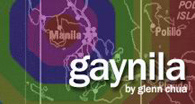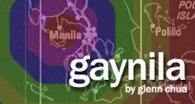The saddest part about going home is - you can't.
It's never what you remember. True, some things don't change (parents, for one). But, after having been away for almost 2 years, I find myself amazed by the new rather than fondly reliving the old. In many ways, as I've grown while I was working my butt off (and working on some delectable twinky butts) in Singapore, the people, the culture, the "home" I knew has grown a lot too.

Perhaps the thing that made the largest impression on me, was how much the "it's ok to be gay" message is present in conventional, normal, day to day television. Two years ago, I remember catching part of a TV soap where some young guy was dealing with coming out. Even then, it was seen as undesirable, painful, difficult.
Now, as a rule, I avoid television. But since my PC is still being shipped, I had no recourse but to escape to the mindless refuge of the masses. In one day, I saw a series which had a handsome gay character, several game shows where the one of the hosts was a stunningly attractive, yet obviously gay man, and even the news was showing some activities by gay groups lobbying for some agenda.
Now, don't get me wrong. Gays and lesbians have always been in the media. But in the past, they were always comedians, sidekicks, etc - they were comic foils, never taken seriously, and still always treated with an amused tolerance bordering on contempt. They were the drag queens, the butt of the jokes, always chubby, funny, ridiculous. No gay actor would ever come out for fear of losing his adoring public - and thus his career.
In a way, it's refreshing. Manila is still not as open as Bangkok, for example, or Tokyo. It's still a predominantly machismo-driven culture, because of the deep-rooted Spanish influences in our past. I'm not even going to go into the demons planted in the common consciousness by the wholesale Catholicism of the populace. But slowly, that is apparently changing. Gays and lesbians seem to be much more readily absorbed into mainstream life.
Perhaps, for readers from Sydney, Tokyo and the other more cosmopolitan cities in the region, I'm talking drivel. So what's so amazing about what I'm rambling on? Some would say it's not only about time, it's our due. But every nation, every culture has to grow at its own pace. It greatly heartens me to see the level of acceptance now possible. The people of Manila have always been hugely influenced by the media (remember, this is a nation who elects actors into the highest public offices).
With gays and lesbians taking on lead roles in the burgeoning media world, more people will, perhaps subliminally, come to accept that it really is "ok". When words come to mean more than just empty phrases ("oh yeah, I got gay friends, they're ok" says borderline homophobic straight boy).

In recent months, the word "Pride" has been bandied around the Fridae forums. Long involved discussions regarding how "Pride" should be developed, and defended. But, as I've always contended, Pride is always personal, and it has to truly begin from the individual.
With the changing acceptance found in Philippine media (and more than television, one can find this growing tolerance in film and radio as well), perhaps, the seeds of Pride which have always been present may now have a chance to grow. For the more militant, Pride demands equal rights before the law. But for it to take shape, one first has to find equal footing before the people.
I do salute the many unobtrusive (well, fine, some of them are quite loud), gay and lesbian producers, filmmakers, actors, and media support people who have slowly and gently been pushing the gay agenda into the national consciousness. Making the whole gay thing, palatable, common, not-yet-quite-natural, but no longer hideously unnatural.
Yes, it feels strange to come "home". It feels strange watching really cute, openly gay guys on TV. It feels strange to finally be able to come out to some of my oldest friends. But more on that in my next ramble. For now, I've come to see that "home" is no longer what I remember it to be, and it will take some getting used to. But then, discovering what "home" has become, promises to be… entertaining.
Glenn Chua is a 30-year-old freelance writer who has recently returned to his home country after spending 7 years working his butt off in Singapore.
